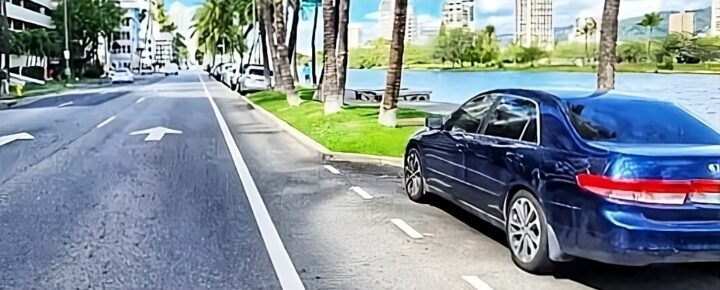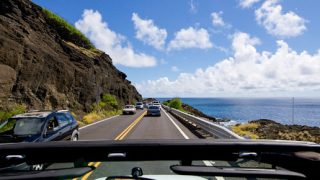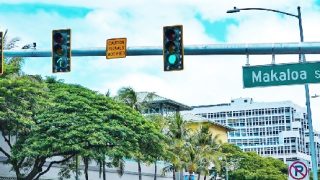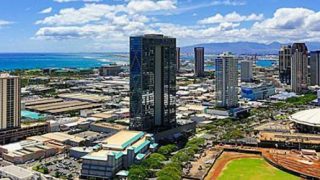Driving around Honolulu can always be challenging, and now visitors have something else to look out for besides that coveted parking space. Starting March 1, the state has launched speed control cameras in Honolulu at the popular intersections below. The first two months of the rollout will only be warning notices, but starting April 30, 2025, you could receive an unwanted souvenir of your stay in the mail—a speeding ticket.
For decades, BOH editors have been driving in Honolulu, yet it remains one of the most unexpectedly difficult places to navigate—even compared to other places we visit for the first time. Lanes end without warning, freeway entrances appear suddenly, and entire neighborhoods—like Diamond Head to Kapahulu—feel like a maze. Driving up from Ala Moana to access the freeway requires multiple lane changes, and along Kapiolani Boulevard, left turns are often restricted either entirely or only allowed at certain hours. With speed cameras adding another layer to the mix, it’s more important than ever for both residents and visitors to stay aware of changing traffic conditions.
According to the Hawaii Department of Transportation, cameras are located at the following Honolulu intersections. We expect more cameras to be added in Honolulu and statewide. If you’re visiting, you may want to check Google Maps before driving around town using our list of streets with the cameras below.
- Vineyard Boulevard and Palama Street
- Vineyard Boulevard and Liliha Street
- Vineyard Boulevard and Nuuanu Avenue
- Pali Highway and Vineyard Boulevard
- Pali Highway and North School Street
- Likelike Highway and North School Street
- Ward Avenue and South King Street
- Kapi‘olani Boulevard and Kamakee Street
- South Beretania Street and Piikoi Street
- McCully Street and Algaroba Street
Visitors vs. residents: Who is more at risk?
One of the biggest questions surrounding Hawaii’s speed cameras is who will be ticketed the most—visitors renting cars or residents driving their vehicles. On the surface, it may seem that visitors would bear the brunt of enforcement, given their unfamiliarity with local roads and sometimes inconsistent speed limit signage.
Some visitors may avoid speeding simply because they are cautious in an unfamiliar place, especially with Hawaii’s well-known law enforcement presence on major highways. On the other hand, some drive as though they are on a freeway in Los Angeles, speeding even on rural roads. Longtime residents may be more vulnerable to enforcement in areas where cameras are newly installed, especially if they’ve traditionally driven above posted speed limits.
Readers have weighed in on this issue. Eva B commented, “I actually think that locals are the only ones who will get the speeding tickets, since they get frustrated with visitors driving too slow.” (That’s typical of any tourist destination in the world).
Alex M wrote, “I absolutely welcome $500 red light and stop signs tickets. I’m absolutely tired of cavalier, clueless drivers blowing red lights and stop signs. Worst offenders? Locals.”
At the same time, visitors face a unique challenge: rental car companies often charge additional processing fees for violations, and disputes over who was driving at the time of the infraction can complicate things.
Patrick raised a concern about how rental car agencies will handle tickets, saying, “I drop off my rental in the morning, it gets rented out in the afternoon by someone who gets a camera speeding ticket. Rental car company thinks it was me and sends me the bill!” (Hopefully, the time of the infraction will assign it to the right person).
The push for speed cameras in Hawaii.
Speed cameras have been on Hawaii’s radar for years. Lawmakers and transportation officials argue they are a necessary tool to curb reckless driving and reduce accidents, particularly in areas with high pedestrian traffic. The initiative follows a national trend, with automated enforcement becoming more common in cities struggling to control speeding.
Hawaii’s program will focus on many locations deemed high-risk for speeding violations. Drivers caught exceeding the speed limit will receive citations in the mail, similar to red light camera programs. Proponents claim this will enhance road safety, particularly as Hawaii has seen a rise in traffic fatalities in recent years.
But the state’s history with automated enforcement is complicated. In the early 2000s, Hawaii attempted a controversial “van cam” program that was widely unpopular and ultimately abandoned. Many residents still recall the backlash, and concerns linger over how this new initiative will be implemented.
Visitors, too, may find themselves caught off guard. When BOH editor Rob was driving in Switzerland, he was surprised to receive a speeding ticket in the mail many weeks after returning home—despite being a conservative driver and thinking he had followed local speed limits.
Similar concerns have surfaced among Hawaii travelers who worry about unknowingly racking up fines and only discovering them long after their Hawaii vacation ends.
Hawaii’s speed limit inconsistencies.
Another factor that could lead to widespread frustration is Hawaii’s inconsistent speed limits. Many roads, particularly on Kauai and Maui, have varying limits within short stretches, sometimes dropping dramatically with little notice. Several drivers have pointed out that this makes it easy to speed unintentionally.
Johannesl noted, “50, 25, 45, 30, 50, 30… Kauai has gotten a little better at smoothing this out, but only a little. Doing a bit more of that would help some everywhere.” Pam S added, “The speed limit between Kapaa and Princeville changes numerous times, and many of the speed limit signs are covered by foliage.”
Speed cameras rely on strict adherence to posted speed limits, but if signage is obscured or limits fluctuate frequently, drivers—both visitors and residents—may find themselves caught in an enforcement gray area.
Are speed cameras more for safety or revenue?
While officials insist that speed cameras are all about reducing accidents, some residents remain skeptical, viewing them as a government revenue generator rather than a public safety measure. The argument isn’t unique to Hawaii—many states and municipalities have faced pushback over the financial motives behind automated enforcement.
DICKIE_D shared a blunt assessment, saying, “Improving road safety’ is a red herring and how a big government machine that only wants to get bigger justifies installing and/or increasing the use of automated traffic cameras… It’s all about getting more money.”
Meanwhile, Kevin S suggested that if safety were the primary goal, the state should be transparent about where cameras are placed. “If the goal of traffic cameras is safety, then post large, clear signs to inform people of camera zones/locations to make people slow down and obey signs. If no signs, then it is clearly a money grab.”
Another issue is due process. Unlike traditional traffic stops, where a driver can explain circumstances to an officer, speed cameras issue automated fines without personal discretion.
Traffic violations are usually civil infractions and only become criminal due to excessive speeding that risks the lives of others or where there have been repeat offenses.
How all drivers can prepare.
For those concerned about getting caught, technology may offer some help. Many drivers already use GPS-based apps like Waze, which alert users to known speed camera locations. Maleko recommended this approach: “Rich’s post is wise: Use Waze. It will say, ‘Red Light (or speed) camera ahead!’ long before you get to the intersection. Stay safe out there!”
Drivers can also take a simple but effective precaution: assume that speed cameras will be in place and follow posted speed limits as closely as possible. While some argue that the cameras exist primarily to generate revenue, avoiding a ticket may lead to driving cautiously and staying informed about Hawaii’s enforcement policies.
The bottom line on Hawaii speeding cameras.
As Hawaii moves forward with its new speed camera enforcement, the impact on residents and visitors remains to be seen. While safer road goals are clear, questions persist about fairness, implementation, and whether the true motivation is safety or revenue. What’s certain is that these cameras will change the way people drive in Hawaii—whether we agree with the approach or not.
What do you think? Will speed cameras make Hawaii’s roads safer, or are they just revenue generators?
Get Breaking Hawaii Travel News







I 100% welcome this because the hypocrisy of “this ain’t the mainland” is a complete joke, considering locals drive like reckless idiots. Red light? Optional. Stop signs? Optional. People in crosswalks? Doesn’t matter. I fully support $500 fines and 2nd offense jail time until people get the message. You want to sell aloha and scold people for being 100′ from turtles but act like that? Kick rocks.
Is this Speed Camera System only going to be used on Oahu for now or are other counties such as Hawaii County or Maui County or even Kauai County also going to enforce speed through these means?
Another dumb tax that will likely affect the locals more than tourists. But they voted for this icky government, so it’s only fair.
Driving there is so convoluted that I always try to follow the speed limit.
Every time I have been to Waikiki I have seen some ambulance assisting someone who got hit in some crosswalk. Drivers in Hawaii are impatient and locals are the worst. IMO this is just a way to give visitors traffic citations while throwing out or waiving tickets for locals. Why make locals pay they don’t pay for any events tourists have to pay for. Don’t really think it will make it safer just another negative for the tourist.
The entitlement by drivers is breathtaking.
Tips for drivers;
1. Pay attention
2. Slow down
3. Be patient
In other words, drive responsibly and obey the laws. Driving isn’t right, it’s a privilege. Other people‘s lives and limbs hang in the balance. Take responsibility for your actions instead of whining, and trying to deflect the blame onto others, the city, the government, etc.
Speed cameras are another example of Hawaiian Government over reach. They will generate funds for the state and insurance companies will adjust their rates for everyone who is ticketed.
Sad thing is you can not face your accuser, you will never know when and where you got the ticket. It will have no affect on traffic safety. Other states gave up on them years ago.
Ask how much of the revenue the state of Hawaii keeps vs. how much the contractor running the system will get paid! What country is the contractor located in?
Keep making it more unpleasant to visit Hawaii and see how that impacts state revenue.
The reason speed cams are unconstitutional by SCOTUS findings is it denies due process. There’s no way to face the accusing official, there’s no way to contest. There’s a non refundable fee for contesting a ticket equal to the fine.
That means, even if you win? The fee is not refundable.
You have to be a special level of “thick headed” to go along with this invasion of your 4th, 5th, andAND your 6th amendment rights.
Wrong. Your ticket will not only include the time and location of your infraction, but also a photo of your car speeding through the checkpoint. Be responsible. Pay attention to what you’re doing behind the wheel. If you do that, you’ll be fine.
Who was driving can always be contested though. Wear a hat and sunglasses and no camera can tell for sure who is in the car at a distance. Your argument doesn’t hold water.
Speed cams have been found to be unconstitutional violations of the 4th amendment but, (everybody knows) Hawaii is exempt from the “supremacy clause”.
What a hilarious post, given that this column appears to be designed for tourists. With the incredibly heavy traffic in Honolulu and parts of Oahu, driving above posted speed limits is a daydream, and not reality. If anyone is caught speeding, my bet is that it will be the residents frustrated with the traffic tie-ups.
I think it’s just a revenue thing not for safety
Just another money grab. Nothing will make a visitor happier after paying exorbitant hotel costs, outrageous airfare and all the imposed fees then receiving a speeding ticket for doing 29 in a 25 mph zone. Not really the feeling of Aloha.
Looks like it’s gotta be 11 mph over the limit before the cameras will issue a speeding ticket.
Now preparing to further criminalize driving. It bad enough Every intersection in the city has a mis-timed yellow light at 3.8 seconds whether the speed limit is 25, 35 or 45 MPH. Huh? Even a 3rd grader can spot the flaw in that rationale.
Lazy DOT just took the signals out of the box and installed with the default programming (3.8 sec) with no regard for the posted speeds thru the intersections.
And now they’re going to nail you for giving it a little extrta gas to avoid entering on red or getting rear ended while slamming on the brakes.
So expect a ticket if you’re going 35 mph through these intersections. How crass! It’s just another money grab. Another in a long list of Sniffen SNAFUs.
At least initially, the speed camera enforcement will occur at the existing red light enforcement intersections. Wouldn’t the concerns you’ve raised as to the former have been present with the latter? What has the experience been so? Has there been tourist feedback? It’s not like we’re reinventing the wheel here.
There used to be a lot of photo enforced zones in different cities within the San Francisco Bay area, and lots of drivers got caught by them. However, after the various cities found out that most of the fines went to pay the company’s that maintained the cameras, the revenue generated was such a small amount that it didn’t make a financial sense to keep the cameras. This “cash grab” only benefits the firms that maintain the cameras. I have seen, in San Francisco, an officer dressed in a multi colored “chicken” suit crossing an intersection and if vehicles don’t stop, other officers in cars or motorcycles pull the drivers over and issue warnings first, then citations a few months later. It helps with pedestrian crossings. But for speeding, I would guess that visible signage and common sense reduction zones would be better.
These are speed cameras, not red light cameras.
Yep, it’s not a good value for the money. After paying the maintenance, the state will make very little money.
Just another way to say “we don’t want you here” and of course to get as much revenue from anyone that does come! People are going other places and are fed up with Hawaii. Such a beautiful and romantic place that soon will be all yours again. You will not have to worry about housing for locals as there will be plenty of vacant vacation rentals and priced cheaply as the landlords will be selling them to move on to different places. It’s like going back to the time before Costco when food stores there sold food at outrageous prices and ripped off the tourists. Those stores are mostly gone now and in the future the locals will not be able to even afford food unless they grow it. Good job guys, you will turn Hawaii into like a third world country that no one wants to go too!
Haven’t driven on Oahu (been there twice, took cabs); go frequently to Maui. When I try to follow speed limits there, the locals often fly by at 10-15 mph over the limit. Visitors obviously speed too, but I think are frequently a bit more speed cautious given their not knowing how well speed limits are enforced there (until they follow locals around). When I have seen speed guns set up on police cars, it hasn’t been in towns where kids are but on the highways between the airport and Kihei and along the Pilani Highway (where the offenders will typically get higher tickets, making me wonder about revenue generation rather than neighborhood safety).
If they really cared about safety, they’d post clear warnings about where the cameras are instead of surprising people. That way, drivers slow down for real instead of just getting hit with a fine after the fact. This plan is messed up at so many levels.
I have very mixed feelings about this. On one hand, I’m tired of seeing people fly through red lights in Honolulu, which is like every day, but on the other hand, I’ve also seen how speed cameras get abused in other states. Hopefully, Hawaii works to get it right and actually improves safety instead of just creating more headaches.
It’ll be interesting to see whether locals or visitors get more tickets. I actually think it’ll be the residents—many of us are used to driving a certain way, and suddenly having cameras in places where we’ve never had enforcement is going to be an adjustment. Example is we know we can drive x number of miles over the limit without a problem, but what about with cameras?
I use Waze all the time, and it’s been a lifesaver for speed cameras in other places. Hopefully, it’ll help here too, but I’d rather just see better traffic enforcement with actual police officers. A camera can’t use common sense like a real person can.
This is a disaster waiting to happen for rental car drivers. What happens when someone gets a ticket and doesn’t even realize it until they’re back on the mainland? The rental companies will just charge their credit cards, no questions asked. And how do you even go about fighting it then.
you can’t and that’s the plan
As a resident, I’m more concerned about how inconsistent Hawaii’s speed limits are. You can go from 50 to 25 in a blink, and sometimes the signs are barely visible. Before ticketing people, they should at least make sure the signage is clear and logical.
Im a lyft driver and i navigate so many variables its daunting. I even plan to get comfortable with these new monitors but Im finding it difficult to keep it at just 5 over or less. Hawaii has never enforced anything under ten over except in the most rare circumstrances. At least put it at 10 over and no citation. Im out there and literally nobody ever seems to find themselves pulled over. People are getting out of control out there yes but cant they just reel it in more slowly. Stoppers arent even a thing now so what incentive do people have to comply. They def shouldnt have new things if they cant take care of the old stuff!!!!
I welcome anything that slows people down on roads like Piilani Highway in Maui. The speeding has gotten out of control, and I see way too many near-misses. If the cameras help with that, great. But I also worry that this will turn into a money-making scheme instead of a true safety measure.
Visitors already struggle enough with rental car costs, now they have to worry about getting a ticket in the mail sometime after their trip? The speed limit signs need to be extra clear if the state wants to enforce this fairly. And other signage better get some improvement as well.
I too have been driving in Honolulu for years, and I still find some intersections confusing. Add in inconsistent speed limits, and it’s easy to see how people—locals and visitors—could get caught off guard. I’m all for safety, but I wonder if these cameras will really help or just add more frustration while making some extra money.
We had speed and red light cameras on our streets once upon a time. They were discontinued because of the lack of manpower required to process the tickets. With the mass layoffs happening, Hawaii drivers may not have to worry about this after all.
Let’s see, how much more can the Hawaiian government do to dissuade us from visiting Hawaii? I’m already done, completely done with Hawaii! This has nothing to do with safety at all, we all know that. If you actually believe that …………. This article clearly points out that it’s going to take advantage of faults within the Hawaiian traffic and roadway system. So if you really are concerned about safety then do some construction work that makes some kind of sense and that will in itself stop so-called fatalities on the rise! Anywhere I’ve seen where they put in cameras it is nothing more than a money grab. Simply and clearly.
Speeders will get caught.
Speed violation cameras have been used alongside red light violation cameras on the Mainland with varying results. One question you should be asking is WHY they are being deployed? Has there been a ‘safety’ problem in the area (some HI speed limits are ridiculously low) or is it just that some people want the traffic slowed down because people like to walk/ride bikes in the area? If the speed cameras get put in, you can be red-light cameras will be too in time. My problem with red-light cameras is that they are ‘zero-tolerance’, like a ticket I got once because I was “0.18 second” (that’s what the form said) late on a light change. You can’t even blink that fast, and no cop I’ve ever talked to would have cited a person for it. Cautioned, maybe, but not ticketed. As for speed, will there be an ‘allowance’, or, if you are going 27 in a 25 zone, do you get ticketed???
anything over 5mph over is citable and its not just photos snapoped it is a 12 second movie of the alleged incident. And a prosecutor or cop goes over the footage and lets all his buddies slide and sticks it to the guy he thinks is a tourist but im definitely local at this point and already cant pay my bills. When are they going to break us. Were at the breaking point and some meth addict is already charging from paranoid delusions. Now … good luck … i havent received any warnings and i know it has taken my picture several times. You can see the flash its going off constantly.
I am a long-time resident of Oahu, and I agree with your assessment that Honolulu is a very difficult city to drive in, with all of its disappearing lanes, changing speed limits, short highway on-ramps, etc. I am not necessarily opposed to red light/speed cameras, although I do think it is primarily a money grab. I just wonder – how will the ticket be issued when, for example, both my husband and I are listed as owners on the title to our cars?